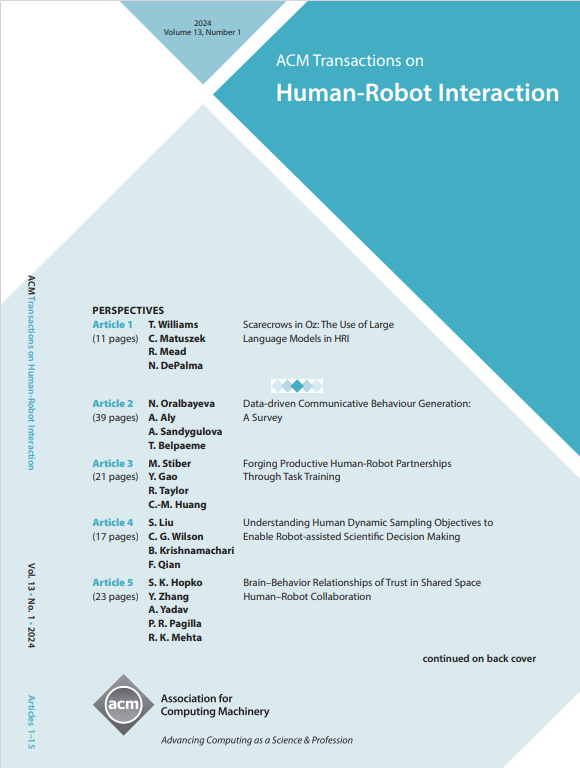L2 Vocabulary Learning Through Lexical Inferencing Stories With a Social Robot
IF 5.5
Q2 ROBOTICS
引用次数: 0
Abstract
Vocabulary is a crucial part of second language (L2) learning. Children learn new vocabulary by forming mental lexicon relations with their existing knowledge. This is called lexical inferencing: using the available clues and knowledge to guess the meaning of the unknown word. This study explored the potential of second language vocabulary acquisition through lexical inferencing in child-robot interaction. A storytelling robot read a book to Dutch kindergartners (N = 36, aged 4-6 years) in Dutch in which a few key words were translated into French (L2), and with a robot providing additional word explanation cues or not. The results showed that the children learned the key words successfully as a result of the reading session with the storytelling robot, but that there was no significant effect of additional word explanation cues by the robot. Overall, it seems promising that lexical inferencing can act as a new and different way to teach kindergartners a second language.通过社交机器人的词汇推理故事学习第二语言词汇
词汇是第二语言学习的重要组成部分。儿童通过与已有知识形成心理词汇关系来学习新词汇。这就是所谓的词汇推理:利用现有的线索和知识来猜测未知单词的意思。本研究探讨儿童机器人互动中词汇推理对二语词汇习得的影响。一个讲故事的机器人用荷兰语给36名4-6岁的荷兰幼儿园儿童朗读一本书,书中有几个关键词被翻译成法语(第二语言),机器人提供或不提供额外的单词解释线索。结果表明,儿童在与讲故事机器人的阅读过程中成功地学习了关键词,而机器人额外的单词解释提示没有显著的影响。总的来说,词汇推理似乎可以作为一种新的、不同的方式来教授幼儿园的第二语言。
本文章由计算机程序翻译,如有差异,请以英文原文为准。
求助全文
约1分钟内获得全文
求助全文
来源期刊

ACM Transactions on Human-Robot Interaction
Computer Science-Artificial Intelligence
CiteScore
7.70
自引率
5.90%
发文量
65
期刊介绍:
ACM Transactions on Human-Robot Interaction (THRI) is a prestigious Gold Open Access journal that aspires to lead the field of human-robot interaction as a top-tier, peer-reviewed, interdisciplinary publication. The journal prioritizes articles that significantly contribute to the current state of the art, enhance overall knowledge, have a broad appeal, and are accessible to a diverse audience. Submissions are expected to meet a high scholarly standard, and authors are encouraged to ensure their research is well-presented, advancing the understanding of human-robot interaction, adding cutting-edge or general insights to the field, or challenging current perspectives in this research domain.
THRI warmly invites well-crafted paper submissions from a variety of disciplines, encompassing robotics, computer science, engineering, design, and the behavioral and social sciences. The scholarly articles published in THRI may cover a range of topics such as the nature of human interactions with robots and robotic technologies, methods to enhance or enable novel forms of interaction, and the societal or organizational impacts of these interactions. The editorial team is also keen on receiving proposals for special issues that focus on specific technical challenges or that apply human-robot interaction research to further areas like social computing, consumer behavior, health, and education.
 求助内容:
求助内容: 应助结果提醒方式:
应助结果提醒方式:


